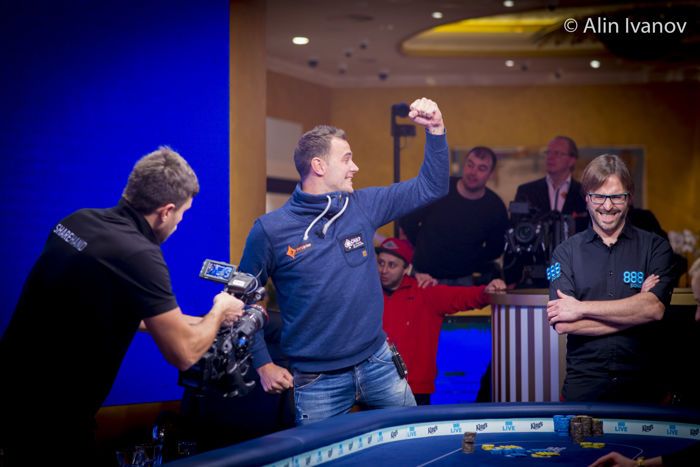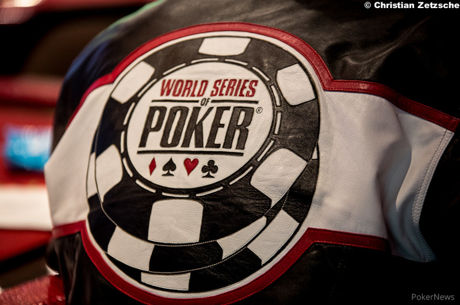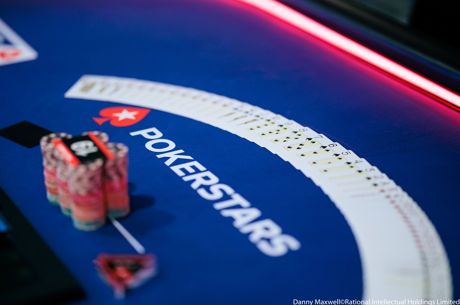Marcel L��ske Introduces partypoker-Backed International Poker Rules

The poker rules section of the PokerNews homepage is amongst the most visited pages of the site. In the articles posted there, we go over the basics of betting, calling, raising, and of course, we have the hand rankings displayed.
If you master those core concepts, you'll usually do just fine stepping into a homegame with some friends. But anyone who's played a big live poker tournament knows there are more rules to playing poker than just knowing when you're allowed to bet and distinguishing a flush from a straight.
Every tournament organizer has a rule book, or at least they should. A lot of the poker tournaments abide by the Tournament Director Association rules, posted on pokertda.com. The World Series of Poker has their own variation of the rules, updated and posted annually. And some tournaments have an entirely different set of rules, some with rules not easily accessible for the players.
And even when the rules are clear, they leave room for debate. Just think about the time the dealer mucked Estelle Denis' aces, or when Prahlad Friedman called, but then didn't. Or think about all the discussion recently about poker rules on Twitter; the rules of the game remain a hot topic in the world of poker.
For well over a decade, Marcel L��ske has worked on, what he calls, the International Poker Rules. It's become his life mission to uniform the rules to play by, and he's been as comprehensive in writing them as one could. And now, partypoker has adopted the set of rules and will introduce them as the definitive book to live by at all of their tournaments.
Rules to Live By
The story starts well over a decade ago. In 2001 and in 2004, L��ske was voted European Poker Player of the Year. He was one of the few full-time professional poker players on the old continent as he traveled from one casino to the other looking for juicy cash games and high-value tournaments. What annoyed him was the lack of uniformity regarding poker rules - every casino had its own set of regulations for the game.
So, together with poker player Michelle Lau, L��ske started to write his own poker rules and he published them online. Jack McClelland, former WSOP Tournament Director introduced the set of rules in the tournaments he was running at Bellagio at the time.
"I don't have anything to do with Daniel Negreanu, I just look at the situation from a poker player's stance."
L��ske, who signed with PokerStars as a Team Pro in 2009, tried to get his rules introduced at the European Poker Tour as well. That never came to fruition and when PokerStars and L��ske parted ways back in 2014, L��ske was left with a rule book and a mission.
What never worked with PokerStars, did work with partypoker for L��ske. He had the right ideas but needed some help bringing them fully to life. L��ske, already an ambassador for the Dutch amateur poker tour called ONKP, teamed up with the organization's founder Mathijs Jonkers. Jonkers, who recently finished third in the WSOP Europe Main Event for �476,585, helped L��ske get the website up and running and treated the endeavor like a proper project - with deliverables and a clear strategy.
L��ske says the rules he forged are focused on the players. They are as detailed as possible. Leaving a lot of wiggle room - decisions to be made by the tournament room and the tournament director - is not something he thinks is good for the game. "It obscures things for the players."
The biggest difference from the TDA rules, L��ske and Jonkers say, is that the International Poker Rules are more precise, they are more elaborate and leave less room for discussion.
Betting Line
One example of that is the betting line on the table. Having and enforcing a betting line on the poker table, L��ske argues, does away with vague rules containing the words "intend," "forward motion," and such. A floor doesn't have to judge if a player intended to bet the full amount, a tournament director doesn't have to act as an arbiter and ask the dealer if a player moved his or her arms forward. If the chips have passed the betting line, that's what is bet - if they haven't; there's no bet.
First Card Off the Deck
Another example is the first/last card off the deck rule. In the TDA rules, a player has live cards as long as they're in their seat as soon as he or she receives their last card. L��ske argues, it is not fair to have people with live cards who had the option to stand behind someone when the cards were pitched.
There has been a lot of debate about this rule already, with Daniel Negreanu the most vocal supporter in favor of the last card off the deck rule.
"The TDA has thought 'oh wow, Daniel Negreanu is against it. And if he's against it, that's not a good problem to have,'" L��ske says. "I don't have anything to do with Daniel Negreanu, I just look at the situation from a poker player's stance. And how do you protect the amateur players best? It's by making sure everyone is in their seats as soon as the hand begins. That way, nobody can walk behind you peaking at your cards. If you want to talk to people on the rail and take selfies with people, just wait till you're out of the hand. Why would the whole world revolve around you?"

Binding or Not
Still, not all rules on the International Poker Rules website are binding. Jonkers and L��ske argue that as there are different gaming laws, hardly all rules can be applied everywhere.
So while the group highly recommends implementing the rules, not all of them are obligated for tournaments to rule by. The use of a shot clock, for example, isn't obligated. "But if a tournament decides to introduce a shot clock, we have outlined exactly how it should be used," Jonkers says.
The same goes for the button ante. The team highly recommends using the button ante and has outlined exactly how it should work if used, but it's still up to the tournament organizers to go with it or not. "But if they do, the rules are very clear as everyone can find them on the website," Jonkers reiterates.
This discrepancy between wanting to be universal and without wiggle room, and not every rule being enforced as strictly as the other, isn't a huge problem according to Jonkers and L��ske. "As long as it's clear for the players, that's good," Jonkers starts. "When an event is announced, the poster will tell you if the button ante is in play or not. And if you see a betting line on the table, that tells you enough as well. If it's in play, and if you see the betting line, the website has all the rules for you ready. If not, that's clear as well. Just as long as things are very clear," L��ske added.
No Grey Area
"It's not 100% perfect, but it's 99.9%," L��ske continues. "The others have left a very big grey area, but we haven't. There's no opaque section of rules, up to debate. Tournaments will have to rely less on the tournament director, the role of tournament director will become less important with crystal clear rules. The tournament room will become a host, tasked with the important role of supervising if everyone is doing their job alright."
"You don't want to end up at a place where the tournament director has all the power."
With the very detailed poker rules, L��ske and Jonkers don't just want to battle the status quo where there's a lot of interpretation going on when it comes to rules; they also want to fix some things that they feel are broken. "The players know best what's fair, and what works and what doesn't. We've all been in situations where everyone at the table agrees with something, but the tournament director rules differently. That often just doesn't make sense," L��ske says.
Taking away some of the power the tournament director now holds is a good thing for the players, L��ske and Jonkers argue. "You don't want to end up at a place where the tournament director has all the power. Because you'll always end up second best to the local guy who tips a lot - no tournament director will rule in your favor in cases like that. The rules need to be crystal clear to prevent things like this," L��ske says.

partypoker Introduces the Rules
Besides the Bellagio, the International Poker Rules were already implemented by Simon Trumper at the Dusk Till Dawn in Nottingham. Trumper, a close friend of L��ske and crucial in fine-tuning the rules in recent months, and partypoker are now rolling out the rules for all partypoker tournaments. And while those were few and far between some years ago, today partypoker organizes live events across the globe; from Barcelona to Sochi and the Caribbean, partypoker events will refer to the International Poker Rules website in case of any obscurity.
For L��ske, partypoker embracing the rules further emphasizes that his new sponsor acts in the players' best interest, and has the players' interests at the center of every big decision they make. "Right now, they are leading when it comes to doing what poker players want, there's no doubt about it. Simon Trumper has been instrumental in getting this to where it is, with the players first."
L��ske also points out John Duthie's involvement with putting players first at partypoker. "I think partnering with John has been instrumental in getting the confidence of the players. He's always put the player's point of view first, which gives a lot of credibility to the brand."
While partypoker is the first tournament organizer to embrace the rules, the project never was never intended to be for partypoker only. "If other organizers want to use the rules, we're more than happy if they reach out to us," Jonkers says. The two hope more organizers will follow partypoker's example. Uniform poker rules across the world remain their utopia.
While L��ske and Jonkers welcome all the tournament organizers to adopt the International Poker Rules, the influence tournament organizers have on the rules will remain thin. They've set it up so that the player is at the center, the rules are there to protect the players and not make life easier for a tournament organizer. As part of that goal, they've set up a Facebook group where poker players can discuss the rules and offer input.
Right now, you can already familiarize yourself with the International Poker Rules by going to internationalpokerrules.com. While reading through the extensive library of rules might not be everyone's cup of tea, the keyword search option might prove useful for players when playing an event. "Simply type in ante," L��ske explains, "and all the rules that mention the ante pop up. It's as simple as that."









